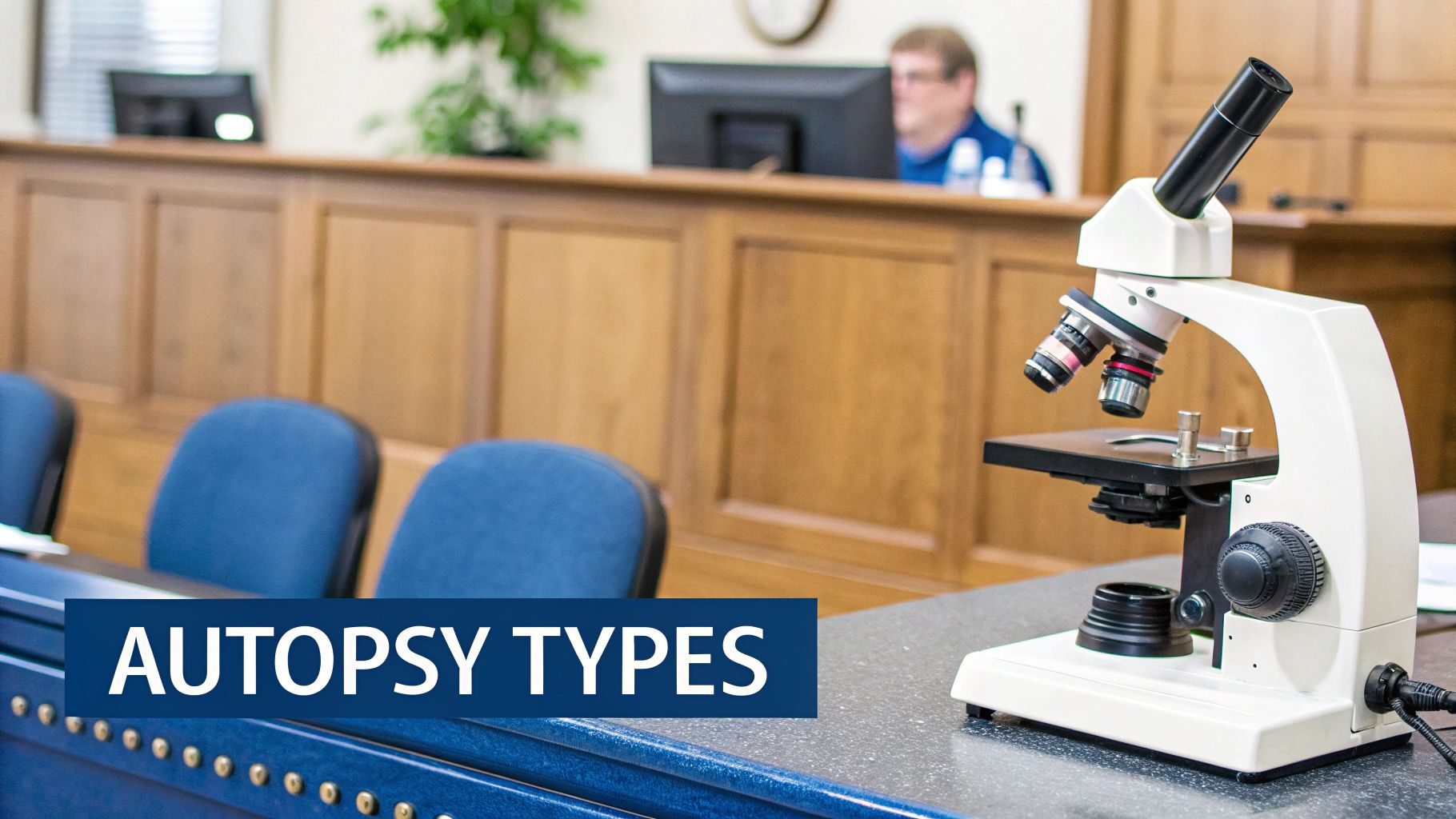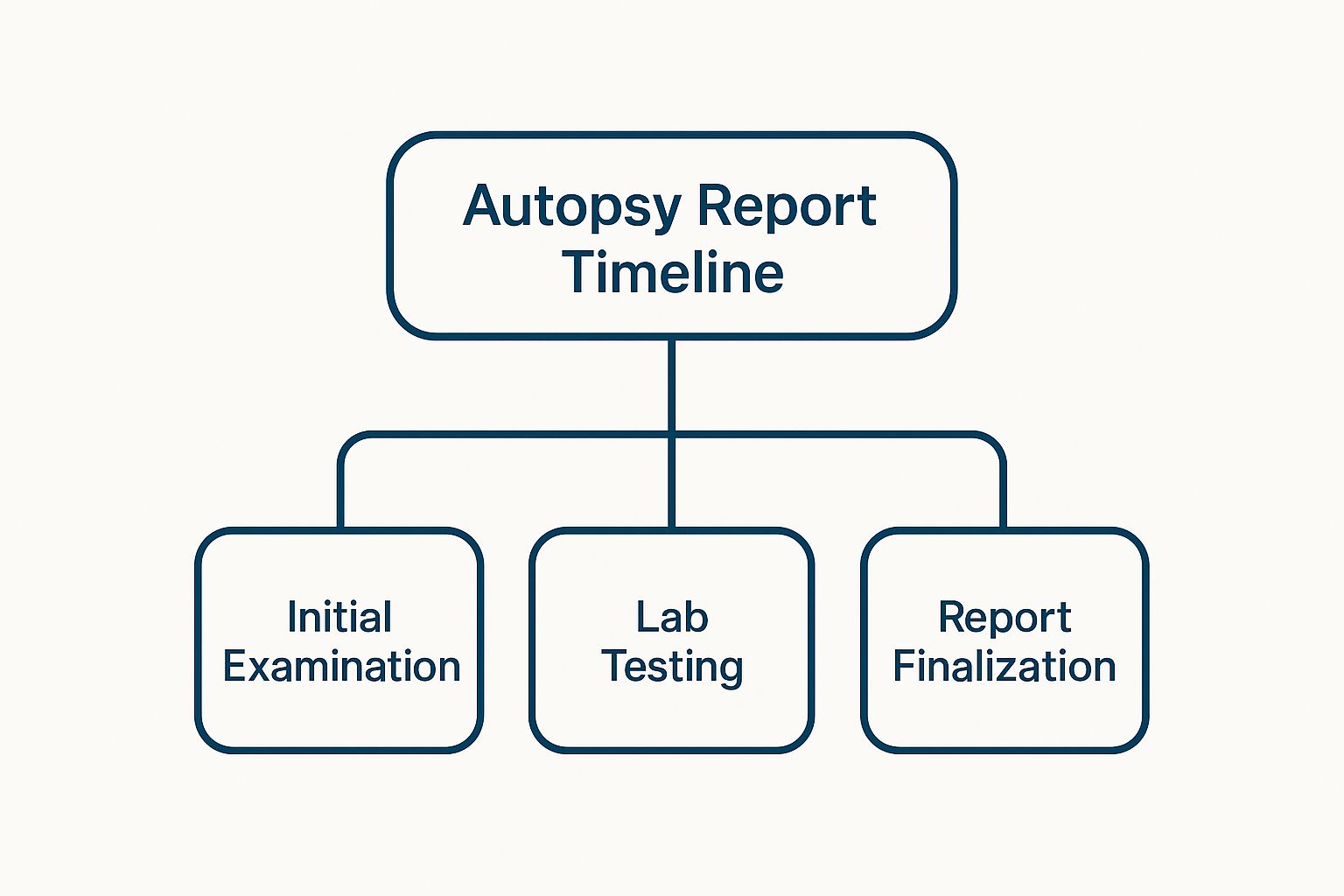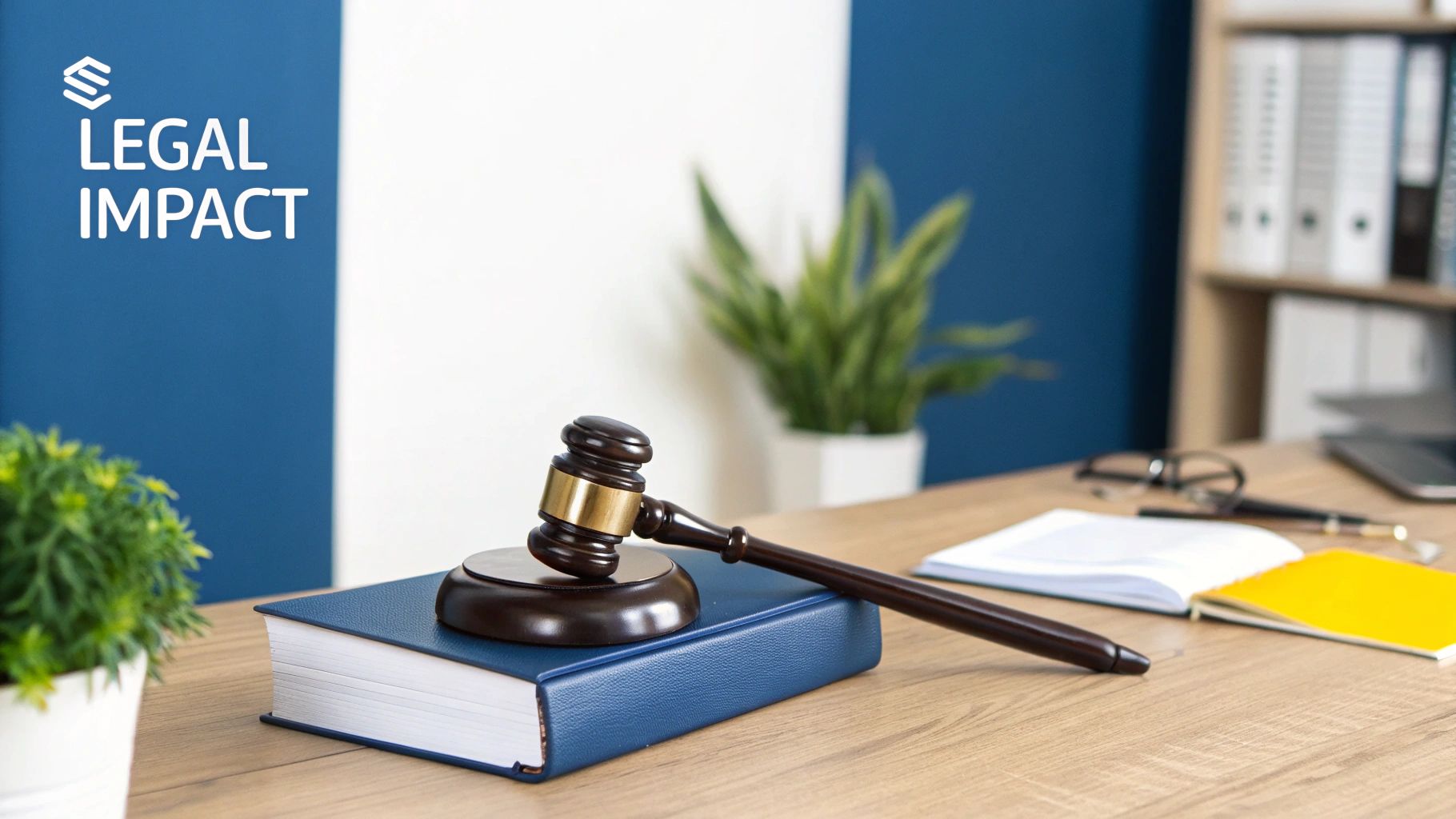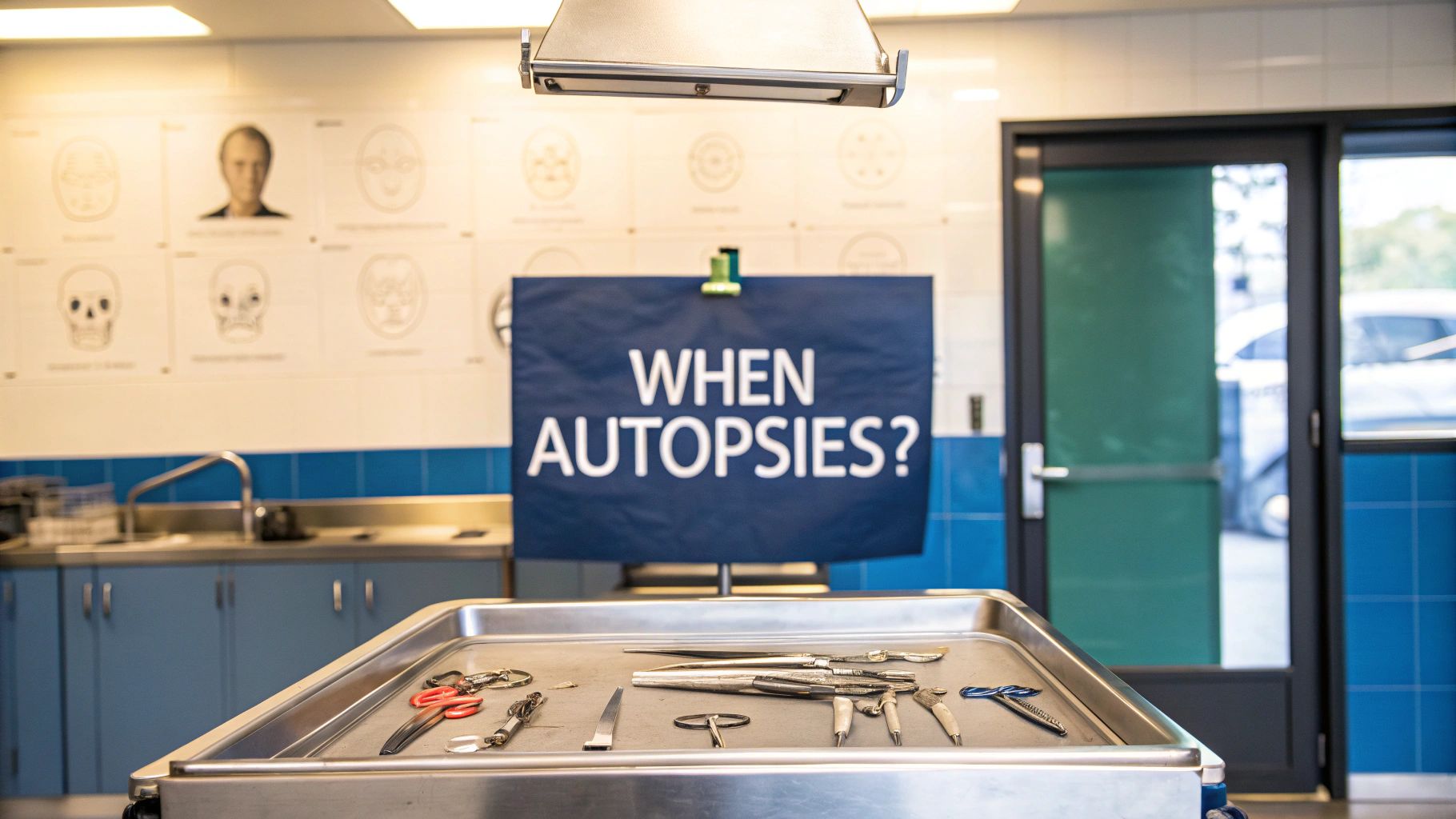- TLDR: An autopsy, or postmortem examination, is performed for two primary reasons: it is either required by law (a medico-legal autopsy) to investigate sudden, violent, or unexplained deaths, or it is requested privately by a family seeking definitive answers about a loved one's cause of death.
- Medico-Legal Autopsies: Ordered by a coroner or medical examiner for legal or public health reasons. Family consent is not required. These are necessary for cases involving homicide, suicide, accidents, or deaths in custody.
- Private Autopsies: Requested by the next-of-kin to clarify a cause of death, confirm a medical diagnosis, or identify potential genetic conditions that could affect living relatives.
- Authorization: Legal autopsies are authorized by the state. Private autopsies require consent from the legal next-of-kin (e.g., spouse, adult child, parent).
- Impact on Funerals: A properly performed autopsy does not prevent an open-casket funeral, as incisions are respectfully made and closed.
Navigating the loss of a loved one is an immensely challenging experience, and the question of an autopsy can add a layer of complexity during an already difficult time. Simply put, an autopsy is a detailed medical examination performed to determine the precise cause, manner, and circumstances of a person's death. This procedure is typically performed for one of two reasons: either the law requires it for public safety and justice, or a family requests it to find clear, factual answers.
Understanding When an Autopsy is Necessary
An autopsy, also known as a postmortem examination, is a specialized medical procedure conducted by a pathologist—a physician with advanced training in diagnosing diseases and conditions through the study of tissues and fluids.
Understanding the circumstances that necessitate an autopsy can provide clarity during a period of grief and uncertainty. The decision to perform one is based on two distinct pathways. The first is when a death falls under the legal jurisdiction of a government official, such as a medical examiner or coroner. This typically occurs when a death is sudden, violent, or otherwise unexpected, and an official investigation is required.
The second pathway is a private one, initiated by a family seeking answers for their own peace of mind. A family may wish to confirm a clinical diagnosis, understand the full extent of a disease, or investigate a potential genetic condition that could have implications for other family members.
An autopsy is fundamentally about providing definitive answers. Whether for the justice system or for a grieving family, its purpose is to replace uncertainty with factual, medical evidence. This article is intended for educational purposes only and does not constitute medical or legal advice.
We recognize the sensitivity of this subject. This guide is intended to explain the reasons behind this decision with professionalism and compassion, providing the information needed to understand a process that, for many, is a crucial step toward finding resolution.
The Two Paths: Medico-Legal vs. Private Autopsies
When an autopsy is considered, the process follows one of two distinct paths, determined entirely by the reason for the examination. One is a matter of public record and legal duty, while the other is a private choice made for personal understanding. These two types are the medico-legal autopsy and the private (or clinical) autopsy.
The first path, the medico-legal or forensic autopsy, is mandated by law. It is an official investigation conducted by a government-appointed medical examiner or coroner, serving the interests of the public and the justice system.
The Medico-Legal Autopsy: A Matter of Law
A medico-legal autopsy is not optional; it is a legal requirement when a death is suspicious, violent, sudden, or unexplained.
According to the National Association of Medical Examiners (NAME), circumstances requiring a medico-legal investigation typically include:
- Homicides, suicides, and accidents.
- Deaths where the cause is unknown or could pose a public health risk.
- Any death occurring while a person is in legal custody.
- Deaths resulting from workplace injuries or potential medical negligence.
In these scenarios, the objective is to determine the cause and manner of death to support legal proceedings or protect community health.
The Private Autopsy: A Personal Choice for Answers
The second path is the clinical or private autopsy, which is requested by the decedent’s family or next-of-kin. This is a personal decision, driven by a family’s need for closure, clarity, and a deeper understanding of what happened.
A private autopsy can empower a family with knowledge. It is a decision made not because the law requires it, but because personal clarity and peace of mind are needed during an incredibly difficult time.
Families often choose this option to confirm a physician's diagnosis, understand the full impact of a known disease, or screen for genetic conditions that could affect relatives. This type of examination can provide answers that medical records alone cannot resolve. If you are considering this option, you can learn more about private autopsies and how they can help families find definitive information.
One path is a public duty performed for legal and societal reasons. The other is a private choice, made for personal insight and emotional resolution.
Why the Law Sometimes Requires an Autopsy

While a family might request an autopsy for personal reasons, there are specific circumstances when the law mandates it. In these situations, a medico-legal autopsy is not a choice—it is a required investigation performed by a medical examiner or coroner.
This legal requirement does not override a family's wishes without cause; rather, it serves a greater public good. The primary goals are to ensure justice, protect community health, and maintain the accuracy of vital statistics. These investigations are initiated when a death is not from clearly natural causes or occurs under suspicious circumstances, providing unbiased, scientific answers to legal questions.
Common Triggers for a Legally Mandated Autopsy
State laws define the specific conditions under which an autopsy is required to ensure that any death with questionable elements receives a thorough investigation. This is a fundamental component of public safety.
Common reasons a medico-legal autopsy becomes necessary include:
- Violent or Unnatural Deaths: This broad category includes homicides, suicides, and accidental deaths of any kind—from motor vehicle collisions to workplace incidents.
- Sudden and Unexpected Deaths: This applies when a person who appeared to be in good health dies without an obvious medical cause.
- Deaths in Custody: Any death that occurs while an individual is in a jail, prison, or other state-run facility automatically requires an investigation.
- Potential Public Health Risks: If a death is suspected to be caused by a communicable disease that could threaten public health, an autopsy is essential for identification and containment.
If a death occurs under unclear circumstances or may be related to medical negligence, a legally required autopsy can establish the objective facts. For families navigating these complex situations, it can be helpful to begin understanding your legal rights in medical mistake cases.
The Broader Impact on Community Safety
Ultimately, the primary function of a medico-legal autopsy is to precisely identify the cause of death. Although autopsy rates in U.S. hospitals declined to approximately 7.4% by 2020 (Hoyert & Kung, 2023), their value in legal and public health contexts remains critical.
These examinations provide objective evidence for court proceedings and help public health officials identify emerging health threats or dangerous trends, which can inform policies and practices to prevent similar deaths in the future.
Seeking Answers Through a Private Autopsy
When an autopsy is not legally required, families still have compelling personal reasons to request one privately. This choice often stems from a profound need for truth and clarity during a time of grief and uncertainty.
For many families, a primary motivation is closure. A private autopsy can answer the difficult question of "why," resolving lingering doubts about a previous medical diagnosis or the effectiveness of a treatment plan. This definitive information can be an essential first step in the grieving process.
Securing a Family's Future Health
Another powerful reason is the desire to protect the health of living and future family members. An autopsy can reveal hereditary or genetic conditions that may have contributed to a loved one's death. This information is invaluable, offering crucial health insights for children, siblings, and other relatives.
Knowledge of a genetic predisposition allows living family members to pursue proactive medical screenings and take preventive measures. In this way, a painful loss can become an act of protection for others.
A private autopsy transforms uncertainty into actionable knowledge. It provides families with the concrete medical facts needed to find peace, validate their concerns, and safeguard the health of their loved ones for years to come.
Validating Concerns and Finding Certainty
At times, families may have questions regarding the medical care a loved one received. A private postmortem examination provides an impartial, scientific review that can either confirm or clarify the circumstances surrounding a death, offering the certainty the family deserves.
Understanding the financial aspect is also an important part of the decision-making process. You can learn more about the cost of a private autopsy to be fully informed. Ultimately, choosing a private autopsy gives families control, helping them navigate their grief with facts rather than unanswered questions.
Who Can Authorize an Autopsy?
Understanding who has the legal authority to authorize an autopsy is crucial, and the answer depends on whether the procedure is required by law or requested privately.
In the case of a medico-legal autopsy, the authority lies with the state. A government official, such as a medical examiner or coroner, has the legal power to order the examination. Because these autopsies serve to answer legal questions or protect public health, they do not require consent from the family. The investigation is a matter of law. To better understand how officials classify deaths for legal records, please see our guide on what is manner of death.
Conversely, for a private or clinical autopsy, the decision rests entirely with the family.
Next-of-Kin Authorization
For a private autopsy, consent must be given by the legal next-of-kin. State laws establish a clear hierarchy of authority to ensure the decision is made by the person legally closest to the deceased.
This hierarchy of consent typically follows this order:
- Spouse
- Adult Children
- Parents
- Adult Siblings
- Other relatives, in a legally defined order
This legal structure ensures that the process is handled with respect for the decedent and proper consideration for the family's wishes.
The image below provides a general timeline for the autopsy process, from the initial examination to the completion of the final report.

While the physical examination is completed relatively quickly, the detailed laboratory analysis required for a comprehensive final report takes additional time.
Frequently Asked Questions About the Autopsy Process

When a loved one passes, the topic of an autopsy can raise many questions, both practical and emotional. Our goal is to provide clear, factual information to help you make informed decisions during an incredibly difficult time. Here are straightforward answers to some of the most common questions.
Can an Autopsy Prevent an Open-Casket Funeral?
This is a frequent concern, and the answer is almost always no. A professionally performed autopsy should not interfere with plans for an open-casket viewing.
Pathologists are trained to conduct the examination with the utmost respect for the decedent. Incisions are strategically placed so they can be carefully closed and concealed by clothing, allowing families to proceed with their planned funeral services.
Who Is Responsible for the Cost of an Autopsy?
The responsibility for payment depends on who authorized the autopsy:
- Legally Mandated Autopsies: When a coroner or medical examiner orders an autopsy as required by law, the cost is covered by the city or county. The family is not financially responsible for these procedures.
- Private Autopsies: If a family requests an autopsy to obtain specific answers about a cause of death, the family or the decedent's estate is responsible for the associated costs.
How Long Does the Autopsy Process Take?
The physical examination itself is typically completed within a few hours and rarely delays funeral arrangements. However, the final autopsy report takes significantly longer, often several weeks or, in complex cases, a few months to complete.
This extended timeline is due to detailed laboratory analyses, such as toxicology testing and microscopic tissue examination, which are necessary for a thorough and accurate report. While a preliminary cause of death may be available relatively quickly, the final, comprehensive report contains the complete and detailed findings.
We understand that navigating these decisions adds a significant burden during a period of grief. If you have further questions about private autopsy services or need to better understand your options, our team is here to provide information with compassion and professionalism. Please feel free to contact us by phone or email.

